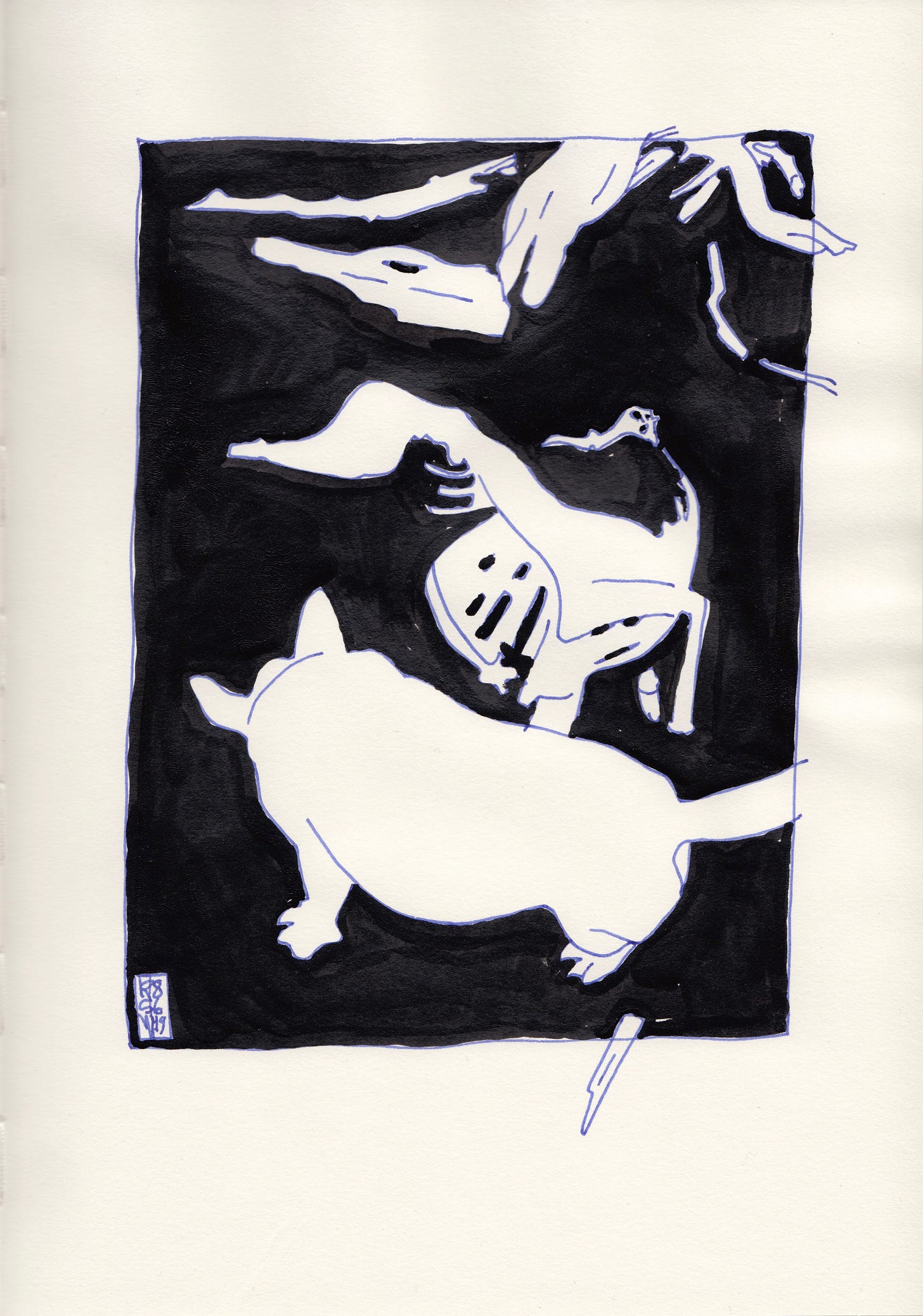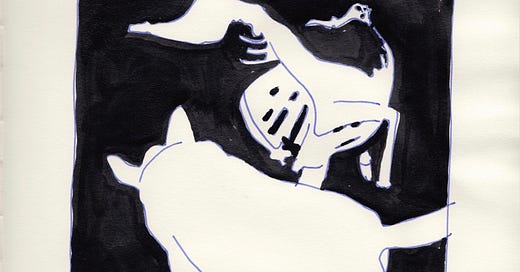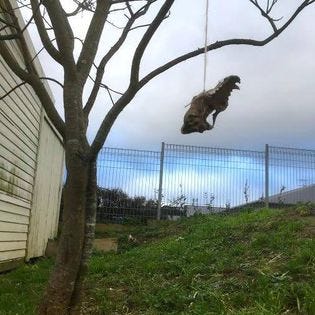Helena Triplett Berger Faust:
”Once I had a house,
Once I had a home.
Once I had a pretty little dog,
My pretty little dog had a bone,
Pretty little dog had a bone.”
Was the city always so dog-saturated? Whence the hound-flood?
Lockdown spawned a spate of babies and puppies, who are now toddlers and young dogs. Not being one to have either, I try to imagine how the chain of thought goes.
‘Well, here we are, stuck at home with nothing to do. A perfect time to make an irreversible life-altering decision!’ Or ‘Well, this sucks! Let’s make / purchase something cute, to distract us and make us feel better.’1
As Covid restrictions eased, the lockdown-babies emerged blinking from their house-cocoons and gaped at all the novel faces. (Oh brave new world!) And the lockdown-puppies… Well… They’re the half-poodles wreaking havoc all over the place. Mixer dogs: gin and tonic, rum and coke— spoodle, labradoodle, cavoodle, etc.2
In London— according to Elise, a sometime professional-dogwalker— organised puppy-napping rings sprang up. The fancy pups were worth thousands of pounds on the black market.3
Dogs, dogs, everywhere. Slobbering, panting, barking. Sending each other wee-mails.4 In Wellington, the rash of dogs caused a corresponding leap in the number of venues welcoming dogs. Cafés, bars etc. Businesses also got dogs of their own: good for the socials— therefore profitable— to have a cute mascot. (Homeless people have dogs for a similar reason: it draws positive attention and donations, as well as conferring warmth and security.) The pubs and cafés put out signs announcing their dog-friendliness and started to sell home-made dog treats from glass jars. Young counter staff patted dogs then touched your breakfast. There were announcements that dogs could ride public transport, under certain circumstances. For whole-hearted dog-lovers, this must have been a joyful shift. For cynics like me… Ambivalence at best.
My beef with dogs had always been that— because they act in full expectation of being universally loved— they don’t respect personal space. (I don’t let a human stranger touch me without asking, so why should I be pleased when an animal does it? I prefer wild animals, who have more self-respect— they wouldn’t dream of touching a human.) I loved some dogs, ones I knew personally, but I didn’t blanket-love dogs as a category, a communal body of beings.5 (I felt for the true cynophobes, though, navigating an increasingly unpredictable-dog-saturated world: I didn’t FEAR most dogs. Only the kind designed to be feared— the square-headed, balls-out fighting dogs, straining at a gangster’s leash.)
With the uptick in canine exposure, though, two things happened for me. On the one hand, the dogs started to work their love-magic on my stony heart. I quickly picked up some wordless language, some scraps of dog protocol. Read their body. Hand low down. Let them sniff you at their own speed. See if they want to be touched. I started to interact with them, to stop and say hi, and pat them if they were amenable. (The fine hard shape of the living dog skull under the hand: learning animal anatomy by touch.)6
On the other hand, I started to see more and more of what I can only call… Bad dogs. Dogs pulling at the lead, dragging their humans along Arctic-style, jumping up on people. Untrained, uncontrolled. I saw a big dog leap at a toddler in a pub,7 its lead pulling it up short as its jaws clopped shut inches from the baby’s soft flower of a face. Nobody else seemed to have noticed. The barmaid knelt down and cooed at it— the dog, not the baby.
News articles started popping up about a spike in the number of dog attacks on seabirds and other wildlife.8 Then I saw one about dog attacks on children also spiking.9 (The articles are ambivalent about whether there’s a lockdown link: the tone of both these articles is placatory— they’re trying to encourage dog-owners to take responsibility for their animals.)
In New Zealand, there are two broad categories of dog. Country dogs, and city dogs. Country dogs are dogs with jobs:10 sheep-herding, pig-hunting, kiwi-sniffing. Consequently, they are trained to behave and obey absolutely. The law of the countryside is that bad behaviour— killing a lamb, roaming onto someone else’s property— is punishable by death. The life of a city dog couldn’t be further from this harsh framework of tasks and rules. The job of a city dog, essentially, is to be cute, to be a kind of furry child.11 Curly fur, long fur, soft fur like a stuffed animal’s— fur that needs clipping, washing, and brushing.
There are ways in which animals are like children, though. A pet is an orphan of culture. Cats are different, they’re more self-sufficient, more like teenagers. They can fend for themselves, at a pinch: to the fatal detriment of any birds, reptiles, invertebrates, etc. in the vicinity. But dogs are a pack-animal. They need enculturation. To not train, or to poorly train a dog is something like not teaching a child manners: a long-term disservice. Manners are sometimes bullshit, but they’re also a primary tool in the basic human-culture kit, which is why they’re one of the first things most babies learn. (“Ta!”)
My guess is that people who think dogs are a type of people also think training them is mean, somehow. Being firm, raising your voice, having different rules for the dog than for the humans— not on the couch, not on the bed— one doesn’t speak that way to a child. But puppy-anarchy creates an untrained dog, at best annoying, at worst dangerous. These lawless dogs now pepper Wellington.
I think my standards are high because of previous acquaintance with some truly exceptional dogs; intelligent, well-trained, full of character. My all-time benchmark of dog excellence was Ben’s kelpie Axis, who I spent a lot of time with. (He lived just down the hill.)
Axis was the offshoot of a wager between Andrew and Anna as to whether kelpies or blue heelers were a superior dog. (Andrew and Anna were / are both Australians living in Te Henga: their breeds of choice were both compact Australian working dogs.) Each got a dog to see whose would be cooler / last the longest. Andrew’s kelpie Ella, in a bid for genetic immortality, populated the Valley with puppies— and Axis was one of them.12
He was a very fine dog: compact, russet, beautifully trained, responsive, clever. A smart pup, with an owner who worked from home, carving stone; they were always together, they grew around each other, a bonded pair. I remember shooting rats out of the trees at dusk with a pistol— just quick black silhouettes on a branch— and Axis running in to finish them off. I remember him singing to the music of a blade of grass between the thumbs.
(Blessings on his memory. The best dog.)

After writing this, though, I went out, and suddenly I saw all the good dogs: the well-behaved, tidy dogs, walking politely at heel. The naughty dogs are just more noticeable, I guess.
Full Moon. Last night close to midnight I walked home from the bus, round the bright-lit South Coast, into the teeth of the Winter wind. Cold lunar radiance silvering everything. Sea-foam spreading itself like spilt lace, like a white fan-coral on the dark sand. The mountains are covered with snow now, and my ears ached deep inside my skull, even under the flaps of my bear hat. Wind flaring my coat’s shadow into black wings. Hark! you shadows, that in darkness dwell, Learn to contemn light. I was startled by my own shadow more than once: the double shadow of the moonlight and the streetlight made one shadow loom inside the other, as if someone else were walking with me.
James Joyce— Leopold Bloom, in Ulysses: “What special affinities appeared to him to exist between the moon and woman?
Her antiquity in preceding and surviving successive tellurian generations: her nocturnal predominance: her satellitic dependence: her luminary reflection: her constancy under all her phases, rising and setting by her appointed times, waxing and waning: the forced invariability of her aspect: her indeterminate response to inaffirmative interrogation: her potency over effluent and refluent waters: her power to enamour, to mortify, to invest with beauty, to render insane, to incite to and aid delinquency: the tranquil inscrutability of her visage: the terribility of her isolated dominant implacable resplendent propinquity: her omens of tempest and of calm: the stimulation of her light, her motion and her presence: the admonition of her craters, her arid seas, her silence: her splendour, when visible: her attraction, when invisible.”13
Newtown on a Monday morning. Sparrows eating chunky puke. Orange lumps of pumpkin or carrot, delicate beaks.
“VOMIT!” yells a passing child to its parent.
The puke is a kind of force field, disrupting the flow of foot traffic. People check their stride, step around. A woman wheels a pushchair right through it. A shaven-headed Buddhist monk— white14— skirts it and sits down to my left, close. Voluminous umber cotton robes over trackpants, tucked into socks, tucked into Crocs. Takes out his smartphone. Puts on his reading glasses to dial. “Richard? It’s Peter.” He cancels a meeting, then gets up and crosses the road, changing bus-direction.
When I look up from writing he seems to be gazing into the window of the French bakery (Closed— is he dreaming of croissants, though? Pain au chocolat? Forbidden pleasures?) Then I see he’s examining an A4-sized poster in the window, with a photo of a person: a Buddhist monk. (Or nun.) I can’t see, from across the road, if the photo the monk is looking at is a photo of himself, a paper mirror; people with no hair look alike. As he waits for the bus he moves his lips, speaking. (Mantras, maybe.)
Don Newt approaches, crab-wise. He says to me, of my book— “Journal. Very small writing. Very important. History. History.” From his shopping bag full of A4 he selects a photocopy, folds and tears it, gives me half. Then his bus comes, on and gone.
Looking out from Southgate’s backbone across the valley of Island Bay, to the hills of Te Kopahau. Brooklyn windmill on the far horizon, blades flicking round. A small dark bird tossed high like a leaf, or a flake of ash.
A glimpse of a tiny curly red-headed child, in the skirts of its Grandmother— like a small spark— as full of life as a fruit is full of juice.
Number plate: I GO DWN
(small subtitle underneath:
DIVE INSTRUCTOR)
Storm-light. Black sky, bright sun. The sea like milky Chinese jade, or celadon.
Andrew says it makes him suspicious when people use the phrase I want a baby: because the baby bit is only the very beginning of the process of being a parent for the rest of your life.
It’s a strange phenomenon: animal as product. (Though I guess that could be said of all selective breeding, or domestication in the first place.) What I mean is that their 50/50 DNA mix is a one-off— they can’t make more of themselves, unless we start getting into quarter-mashups and refinements, and mangle language further to describe them: a kind of North-North-West of dog.
Amy recently discovered why pirates had parrots: because rich people had parrots— along with monkeys and lapdogs and other toy pets— and the parrots were looted along with the jewels and money and so on.
Not to mention the increased likelihood of stepping in dogshit. (Likely cause: child who has promised they will totally look after a dog, they will feed it and everything / irresponsible adult, likewise = basically doesn’t want to touch poop, even through plastic.)
When people say they love all dogs I’m like— Really? All of them? That’s like saying you love all people. Objectively, some dogs are arseholes, just like some people are arseholes.
Parrotdog
The thing is, though, dogs like to have a job, to be useful. They’re into it.
Writing that sentence, I didn’t even see the execrable term fur-baby coming.
Once Ella was on heat, confined to a cage— à la Jess from Footrot Flats— and was somehow impregnated through the chicken wire by the mongrel from down the road, Clapton. But Axis wasn’t one of those cursed children. I think he was more on purpose / had a kelpie Dad.
“What spectacle confronted them when they, first the host, then the guest, emerged silently, doubly dark, from obscurity by a passage from the rere of the house into the penumbra of the garden?
The heaventree of stars hung with humid nightblue fruit.
With what meditations did Bloom accompany his demonstration to his companion of various constellations?
Meditations of evolution increasingly vaster: of the moon invisible in incipient lunation, approaching perigee: of the infinite lattiginous scintillating uncondensed milky way, discernible by daylight by an observer placed at the lower end of a cylindrical vertical shaft 5000 ft deep sunk from the surface towards the centre of the earth: of Sirius (alpha in Canis Maior) 10 lightyears (57,000,000,000,000 miles) distant and in volume 900 times the dimension of our planet: of Arcturus: of the precession of equinoxes: of Orion with belt and sextuple sun theta and nebula in which 100 of our solar systems could be contained: of moribund and of nascent new stars such as Nova in 1901: of our system plunging towards the constellation of Hercules: of the parallax or parallactic drift of socalled fixed stars, in reality evermoving wanderers from immeasurably remote eons to infinitely remote futures in comparison with which the years, threescore and ten, of allotted human life formed a parenthesis of infinitesimal brevity.
Were there obverse meditations of involution increasingly less vast?
Of the eons of geological periods recorded in the stratifications of the earth: of the myriad minute entomological organic existences concealed in cavities of the earth, beneath removable stones, in hives and mounds, of microbes, germs, bacteria, bacilli, spermatozoa: of the incalculable trillions of billions of millions of imperceptible molecules contained by cohesion of molecular affinity in a single pinhead: of the universe of human serum constellated with red and white bodies, themselves universes of void space constellated with other bodies, each, in continuity, its universe of divisible component bodies of which each was again divisible in divisions of redivisible component bodies, dividends and divisors ever diminishing without actual division till, if the progress were carried far enough, nought nowhere was never reached.”
(How many hours, days, weeks work to make each of these sentences?)
The ones who ride the bus with me are often Cambodian, travelling to and from the golden temple on the hill.








At Moon, a brown labrador appeared at the edge of the table along with the chips, and stared at them, barking from time to time. A musician in an Iron Maiden t-shirt was worried that the dog's tail was going to knock his expensive electric guitar off its stand. I realised I'd forgotten to mention dogs knocking things over with their tails.
I love it how the speculative weaves in with the cinematographic, and the bit with the moon and the foam and the shadows made me crave for a novel by the same author :)